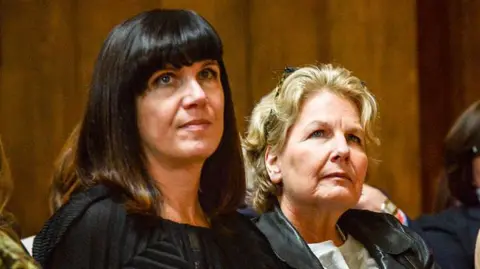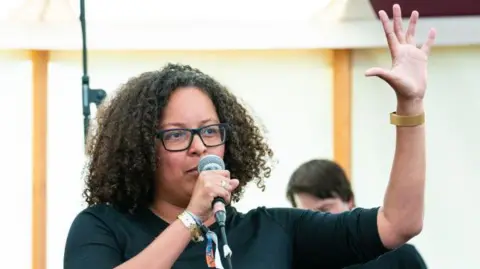ARTICLE AD BOX

 Getty Images
Getty Images
Catherine Mayer and Sandi Toksvig at the launch of the party in 2015
It is the "end of the party but not the movement", Women's Equality Party co-founder Catherine Mayer has said, after members voted to shut down the organisation.
Speaking to the BBC's Woman's Hour, Mayer said the party was closing partly due to financial pressures but also because the party's approach "was not working in a polarised world".
Co-founder Sandi Toksvig said they would now try to implement change through activism rather than spending money standing candidates in elections.
She also denied the party's demise was linked to its stance on transgender issues, saying a fall in membership was due to women struggling to afford the members' fees during the cost of living crisis.
The party was launched in 2015, following conversations between Mayer and Toksvig in which they shared their "impatience with the slowness of change" on women's issues.
Mayer said they wanted to emulate the success of the UK Independence Party who had managed to change the Conservative Party's stance on the European Union by winning votes in their traditional heartlands at elections.
"We basically had a couple of beers that turned out to be very expensive," Mayer said.
The party - initially led by journalist Sophie Walker - campaigned on closing the gender pay gap, making childcare more affordable and increasing the rate of prosecutions for domestic violence.
In 2016, Walker came sixth in the London mayoral elections winning 2% of the vote.
However, the party failed to build on its vote share and in the general election earlier this year, it stood four candidates and won just 1,275 votes.
It had also received some criticism over its position on transgender rights.
Journalist Suzanne Moore was involved in setting up the party in 2015, but in a recent article on Substack, said the party leaders had ignored the views of their own membership "70% of whom did not support Self ID".
A self-ID system would allow someone to change their legal sex without a medical diagnosis.
Currently, UK adults can get a gender recognition certificate if they meet certain criteria including a diagnosis of gender dysphoria.
Defending their approach, Mayer said the party had been "very clear" and "supported the right, from the beginning, for people to determine their own gender".
"We also tried very, very hard to make space for all areas of opinion on this."
Toksvig said: "I couldn't be more trans-inclusive but I didn't want to shout at people.
"I don't want a polarised debate... what I wanted was a space where we could carry on having the discussion."
Asked if the party's position on transgender rights had led to a drop in membership numbers, Mayer said they lost some members but also gained members and that overall it was "net neutral if not slightly positive".
Toksvig said the cost of living crisis following the pandemic had led to an overall drop in funding.

 Getty Images
Getty Images
Mandu Reid led the party since 2019
Last month, the party's leadership recommended to its members that they should vote to shut down the party and over the weekend, members voted by 78% to back the proposal.
Toksvig said: “If the way that we get attention to the incredible issues – for example women’s health care, affordable childcare – if that’s through activism rather than through trying to stand candidates that we can’t really afford in elections, then this is going to be the way forward.”
In 2024, the party raised £9,000. In comparison Reform UK brought in £4.3m and the Liberal Democrats raised around £12m.
"What we have is a movement and what we are now looking at is how we transition that into more reforms and more effective activism," Mayer said.
"It's the end of the party, but not the movement."
They said they would continue to back the party's four local councillors in Basingstoke, Cheshire and Dorset.
"We will be supporting them," said Toksvig, adding: "What we won't be worried about is keeping the lights on."

 5 months ago
20
5 months ago
20








 English (US) ·
English (US) ·